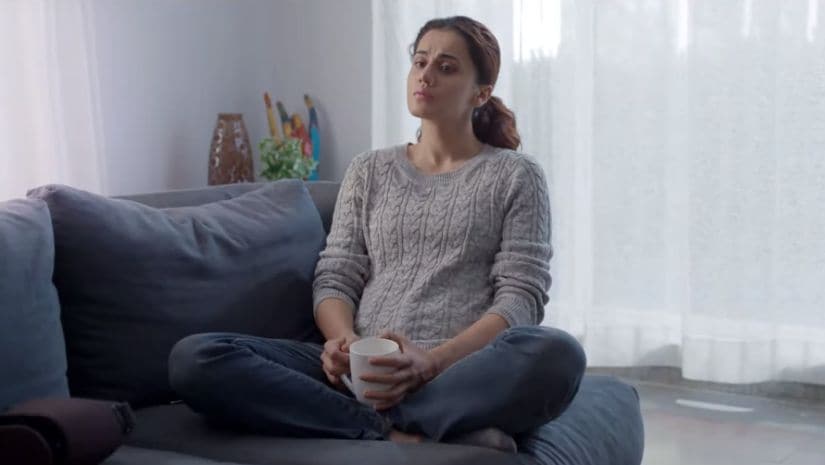The Taapsee Pannu starrer Game Over is a well-scripted and tightly edited movie with minimalist sets which cuts across genres. It has elements of everything — slasher, horror, thriller — woven into it. Directed by Ashwin Saravanan and edited by Richard Kevin, it is enhanced by A Vasanth’s brilliant camera work and Ron Ethan Yohanan’s background score. The script and screenplay were jointly written by Ashwin and Kaavya Ramkumar, who is a doctor by profession. Perhaps having a female scriptwriter on board who also had medical knowledge helped Ashwin to craft a unique film which was able to delve deep into a woman’s psyche. I don’t want to talk about the neatly convoluted plot here. Not even with spoiler alerts in place. I leave that to the reviewers. What made Game Over stand out for me was its feminist angle and its 180 degrees look at what Post Traumatic Stress Disorder (PTSD) can do to a woman. Swapna (Taapsee Pannu) is a beautiful young woman and a video game professional. She is also a sexual assault survivor who has severe panic attacks. She is afraid of the dark. She is afraid of being alone. She is even afraid of leaving her house. [caption id=“attachment_6726271” align=“alignnone” width=“825”]  Taapsee Pannu in a still from Game Over. Screengrab from YouTube[/caption] Swapna lives in a big house with her housekeeper Kalama (Vinodhini Vaidyanathan) who knows her trigger points and comes to her rescue whenever she collapses with fear. Her only other support is her psychiatrist (Anish Kuruvilla) who explains to her how her panic could increase and unleash her worst fears as the first anniversary of her trauma draws near. He advises her to not try to battle them alone but to take the help of her loved ones. But Swapna has become a paranoid loner. She shuns everyone including her own loving parents. The images of her assault and the questions associated with it keep revolving in her head. Could she have avoided the assault by staying at home that night as her father had suggested? Or could she have fought harder and prevented it from happening? In a restaurant, a couple of boys have on their phone her “rape video” which her attacker had made and circulated. When they spot her and recognise her they gleefully start making comments. This sets off another paroxysm of panic and she flees. Swapna’s actions and reactions help us to understand the sense of helplessness, guilt, shame, anger and sorrow survivors of violent sexual assault, in particular, go through. Even if the perpetrator is in jail (as in this case), the triggers remain and the feeling that it could happen again never goes away. She even tries to take her own life rather than face this constant inner turmoil and in the process ends up in a wheelchair. It is this potent mix of emotions which drives survivors to an edge and prevents them not just from speaking out but even from confiding in the persons to whom they are closest. How Swapna fights these fears on her own, forms the weft and weave of the story. The imagery the filmmakers conjure up to give a form to those fears are the ones which give the movie its edge of the seat thrills… burning fires, beheaded bodies, masked men wielding knives and swords. While the core theme had a feminist angle, the packaging was a masala mix. It even had a mysteriously active “memorial tattoo” thrown in for good measure. But it was a sophisticated and innovative mix. Without the various elements which went into it, Game Over would have ended up as another trite film with the message getting lost in horror music and melodrama. But, here the message was stark and clear. “You cannot hide from your inner demons. You need to come out and fight them on your own.” This is an important message at a time when the MeToo movement is going through a turmoil. It should make audiences sit up and think. The situation portrayed in this film is of a sexual assault by a stranger. This is bad enough. But what if the assaulter is a known person… A close relative, a husband, a respected boss, a mentor or a teacher? What if the woman’s professional career is at stake? What if the assaulter is the survivor’s Editor or co-actor or colleague or a powerful lawmaker? Would not these same demons go around in the head, scaring her into silence for even longer periods of time? Because she did not speak up at once does it mean it never happened? Even when survivors of sexual assault find the courage to come out and speak in graphic detail about what they went through, they may get sued for defamation or face social boycott or their cases may get buried in the courts for years at a stretch forcing them to move on with their lives. As Swapna demonstrates in the film, the trick is not to give up, but to stand up for yourself.
The Taapsee Pannu starrer Game Over is a well-scripted and tightly edited movie with minimalist sets which cuts across genres.
Advertisement
End of Article


)
)
)
)
)
)
)
)
)



